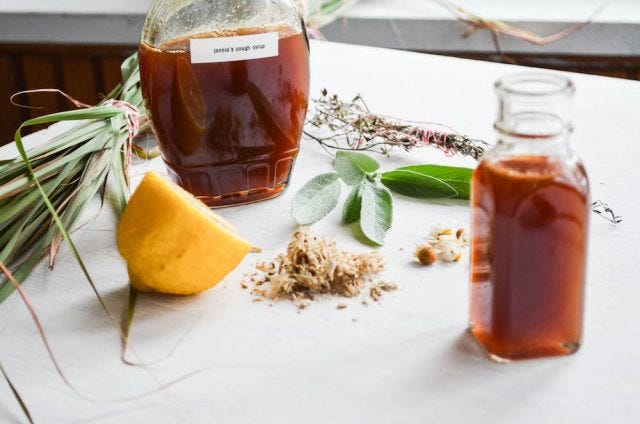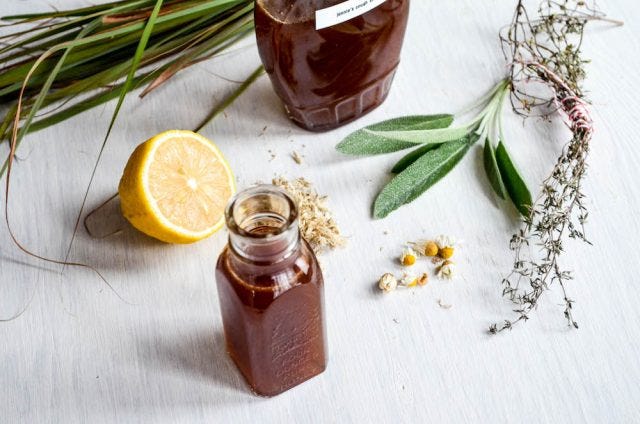Originally published November 2018
Not even a month into the school year, Isabella had her first sick day. What began as a faint cough on a Friday evening, morphed into a persistent one, accompanied by a sore throat. I’ve been through enough cold seasons to know we need to stay on top of her cough lest it flare up into bronchitis.
Upon inspection of the medicine cabinet, a bottle of all-natural cough syrup I bought in London just shy of two years ago caught my eye. I know—I checked the date, and surprisingly the bottle notes it’s good until early 2019. More importantly, though, it got me thinking about making my own homemade all-natural cough syrup. For real this time, not just file the idea in the back of my mind for another day.
Everything in the ingredient list was familiar, or at least easily pronounced, aiding in my confidence. The real pride came from knowing I had quite a few of the necessary herbs (lemongrass, sage, thyme, and chamomile) growing in my own garden to make a natural cough syrup. I even added a few apple cores from the growing pile in the freezer to help balance the herbaceous taste.
Cinnamon and lemon are easy enough to come by. You might already have them in your pantry to get started on this homemade all-natural cough syrup.
The one specialty ingredient I did need to buy was marshmallow root. Marshmallow root was very easy to find in the bulk section of the health food store in Woodstock.
Unlike most over the counter cough syrups that simply mask symptoms, I firmly believe this homemade all-natural cough syrup helps aid in recovery. We’ve been using it as needed for the last month. Since it’s all-natural, you can take it as often as needed.
Lemon, sage, and thyme offer antiseptic benefits to the immune system.
Honey and marshmallow root coat the throat to ease soreness. Honey also has antibacterial benefits, but in case you want a vegan alternative, you can use agave. I personally think maple syrup would be too sweet. Ginger and cinnamon are known natural anti-inflammatories which help reduce swelling.
Chamomile is calming, especially helpful at bedtime, though it’s not so much you’ll be drowsing off during the day. Lemongrass also eases anxiety, reduces inflammation, and helps prevent infection (it's also good for oral and dental health, incidentally).
I grew lemongrass for first time this year, and was pleasantly surprised at how easily it thrived in my garden. Just remember before using lemongrass in this recipe (and any recipe, actually), you need to give it a few good thwacks with the back of your knife or a rolling pin (much safer method), to release the herb's essential oils.
Since this is completely natural, it is also somewhat perishable, so I suggest storing it in the fridge for freshness. I keep my main stash there, and a small bottle on the counter top that I replenish as needed since the girls prefer it at room temperature.
Amidst all your Thanksgiving menu planning, I’d add this recipe for Homemade Herbal Cough Syrup to your must make list. I’d go so far as to say it makes an excellent holiday gift, too! If I were hosting a crowd, I’d be tempted to give everyone a little bottle as a memento to help stay well into the New Year.
The recipe related to this post is available for paid subscribers only. Join hundreds of other subscribers now for only $5/month or $30/year (that’s six months free!). Quarterly e-cookbooks are an additional benefit of paid membership.








